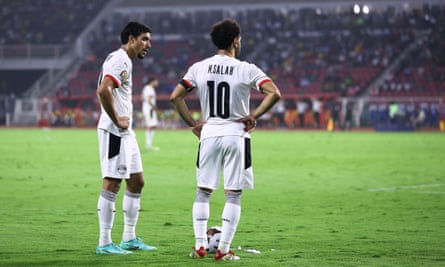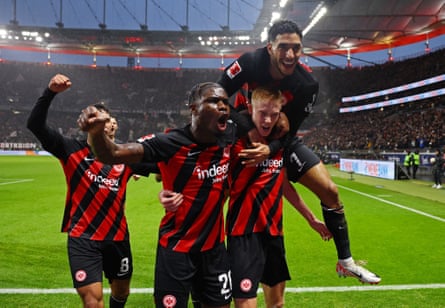E
During the late 2000s, Egypt’s successful run at the Africa Cup of Nations was characterized by forward-thinking attackers who were focused on one main objective: scoring goals. In 2006, Ahmed Hassan and Emad Moteab contributed eight out of Egypt’s 12 goals. Two years later, the trio of Hosny Abd Rabo, Mohamed Aboutrika, and Amr Zaki each scored four goals. In 2010, Hassan and super-sub Gedo dominated, with an impressive goal average of one every 35 minutes.
The national team currently has their top scorer, Mohamed Salah, in their ranks. However, there has been a shift in mentality and he has only managed to score six goals in three Afcon tournaments, with two goals in each. This, coupled with the fact that he is expected to be Egypt’s main playmaker, highlights the need for assistance.
After the successful era in the late 2000s, Egypt has reached two Afcon finals, but lost to Cameroon in 2017 and Senegal in 2022. Throughout both of these journeys, Egypt’s defensive style of play led them to the championship game, but ultimately resulted in their defeat.
This does not mean that playing defensively in football is always a negative strategy. In certain situations, it is necessary. In tournament football, it is often crucial to have strong tactical awareness in order to succeed. If Salah and his team had won either of the Afcon trophies, no one in Egypt would have criticized their playing style. However, the final losses clearly demonstrate the need for balance. While a solid defense can take a team far, it is crucial to also have reliable goal scorers who can perform under pressure. If Egypt relies solely on Salah for scoring and creativity in the next Afcon, they may face a familiar outcome.
The forward line for Egypt’s team is currently made up of Salah and Mahmoud Hassan, also known as Trézéguet, on the wings, and Nantes’ Mostafa Mohamed in the center-forward position. While all three players are performing well for their respective clubs, there is another player who could prove to be a strong goal scorer and a potential backup for Salah: Omar Marmoush.

The 24-year-old has thrived since moving to Eintracht Frankfurt last summer, taking the place of the seemingly irreplaceable Randal Kolo Muani. Marmoush is now Eintracht’s top scorer, having already bettered his best full‑season attacking statistics with seven goals and three assists in 14 league games.
One of Marmoush’s standout performances this season was against Bayern Munich in Frankfurt’s 5-1 win. He scored a goal and provided two assists. What makes his performance even more impressive is the diversity of goals he can score. He is able to outpower defenders, score from long distances, and maneuver through a crowd of players to find the back of the net. Marmoush has truly transformed as a player.
He originally played as a winger, but under Dino Toppmöller, he has learned to play in a more advanced position. His newfound versatility as a lone striker or part of a forward duo has helped improve his ability to score goals. Toppmöller praised Omar, saying, “He’s a great player who has recently found success in scoring goals.” After Frankfurt’s 3-0 win against Union Berlin, where Marmoush scored the first two goals, Toppmöller stated, “We’re developing his skills in that position. The goals he’s scoring now are a result of his hard work for our team.”
Due to his speed, he frequently puts defenders in uncomfortable situations when he makes a long run. However, he has now developed a knack for consistently finding himself in dangerous positions and using his technical skills to benefit our team.

The Egypt manager, Rui Vitória, has acknowledged the progress made by Marmoush in the current season. He mentioned him alongside Mohamed as a potential threat for their team’s goals, making us wonder if he will play a different role.
bypass the advertisement for the newsletter
after newsletter promotion
Mohamed is a classic center forward, known for his aerial ability and relentless effort to outplay opposing center-backs. However, he may often find himself alone in the attack. Marmoush, on the other hand, has higher averages than Mohamed and Trézéguet for shots on target, chances created, and progressive carries per 90 minutes. He has the ability to drop back, skillfully maneuver out of tight areas, and set up opportunities for his teammates, including Salah.
For over ten years, Egypt has lacked strong options in their front line. However, that has changed with the recent emergence of talented players. It is hoped that Vitória will recognize the individual strengths of his forwards and make strategic decisions based on that.
After their victory in 2010, Egypt has found themselves in an unusual situation. Despite being considered a strong contender for the Afcon due to their reputation and star player Salah, they have not performed well. Opposing teams tend to play defensively against the Pharaohs, but Egypt’s lack of offensive prowess also leads them to play defensively.
The outcome is a maximum of 90 minutes of extreme boredom for those who support Egypt, as they have not been rewarded when another team ultimately wins the trophy. In Ivory Coast, we may see the same determined Egypt team from the last ten years, but there is a chance that this time, when they reach the opponent’s side of the field, there will be more skillful and dynamic play that fans have come to anticipate from their talented players.
Salah has been a standout player for the Pharaohs for a while and is expected to continue in that role for the foreseeable future. He has consistently been in the public eye since his debut and has been responsible for carrying a lackluster team. However, this has not been sufficient. Every star needs a suitable supporting cast, and Marmoush has the potential to fulfill that role if given the opportunity.
Source: theguardian.com


















